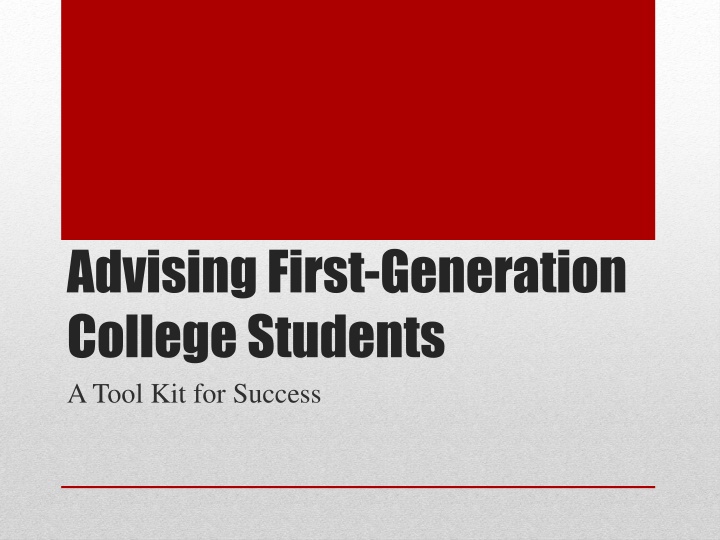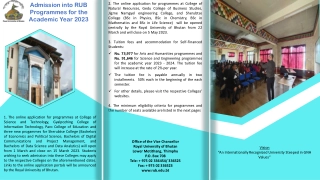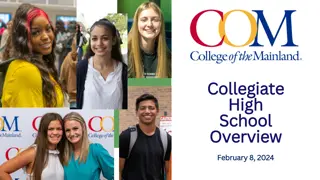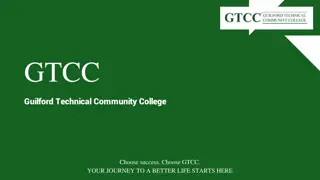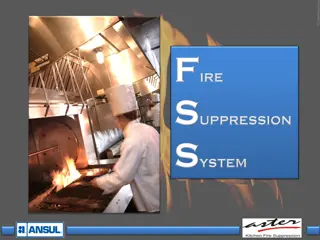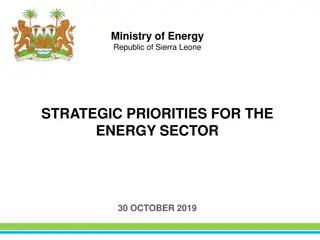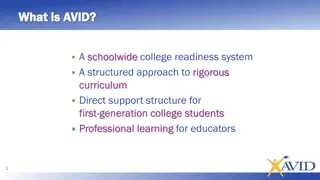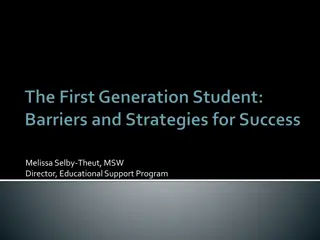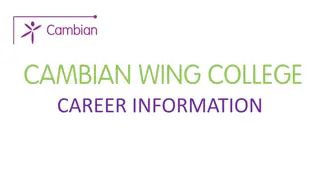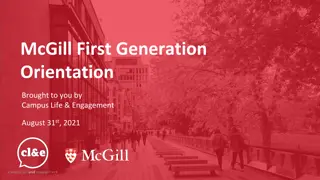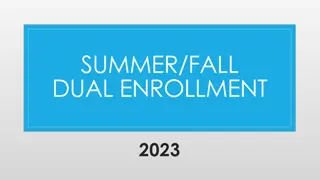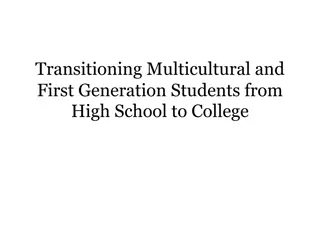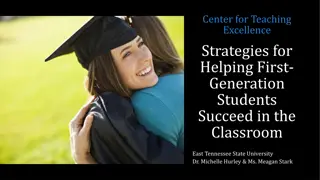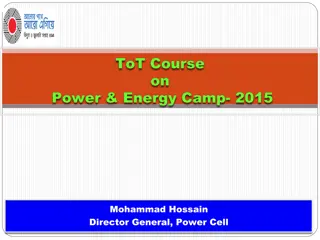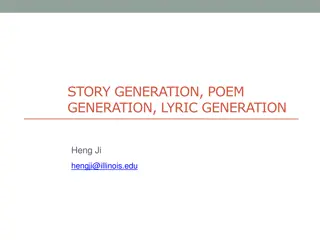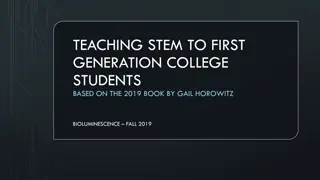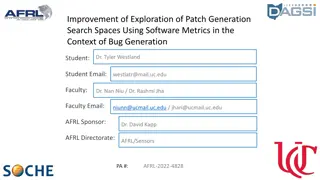Supporting First-Generation College Students: A Comprehensive Guide
Explore key themes, barriers, and strategies for supporting first-generation college students on their journey to academic success. From addressing access challenges to providing essential resources, this toolkit emphasizes the importance of mentorship, understanding student needs, and fostering a supportive campus environment. Discover practical tips for advisors and educators to empower first-gen students and enhance their college experience.
Download Presentation

Please find below an Image/Link to download the presentation.
The content on the website is provided AS IS for your information and personal use only. It may not be sold, licensed, or shared on other websites without obtaining consent from the author.If you encounter any issues during the download, it is possible that the publisher has removed the file from their server.
You are allowed to download the files provided on this website for personal or commercial use, subject to the condition that they are used lawfully. All files are the property of their respective owners.
The content on the website is provided AS IS for your information and personal use only. It may not be sold, licensed, or shared on other websites without obtaining consent from the author.
E N D
Presentation Transcript
Advising First-Generation College Students A Tool Kit for Success
Introduction Videos and Discussion of Themes Barriers to Access & Success First Gen Needs Overcoming Barriers Outcomes of Advising & Mentoring Other Effective Strategies Resources for Advisors, Mentors, & Students References
First Gens Speak Out https://www.youtube.com/watch?v=FyJRiCWy7xo video produced as part of a national appeal to keep the college dream alive https://www.youtube.com/watch?v=j-nosalDTac 2014 documentary created by the College of Education at Kansas State U Discuss themes present in videos
Barriers to Access & Success Students of racial, ethnic, international, low income and first generation backgrounds experience a number of special barriers to educational attainment. (Case & Hernandez, 2013; Creighton, 2007; Yeh, 2010)
Barriers to Access & Success Academic under-preparedness Financial concerns Racism, marginalization, and discrimination Difficulty in acclimating to/navigating higher ed - cultural discontinuity
Barriers to Access & Success Family demands Lack of support Balancing school and work Language barriers Confusing laws and regulations
First Gen Needs First gen students will often bring personal issues to advisors because they lack this support from family Rely on advisors to have comprehensive knowledge of campus and resources Need a relationship of trust built on understanding of student s background/experiences Require a network of support
Upon Arrival Help first gen students focus their studies Recommend peer support groups Help to strategically shrink a larger campus
Critical Topics for Year One Nature of college learning Meaning and purpose of the curriculum Resources available to explore majors/careers Academic support programs Becoming connected on campus Academic criteria attached to financial aid packages Social opportunities (Darling & Smith, 2007)
Overcoming Barriers Counseling/Advising student development and diversity counselors support retention One-on-one faculty-to-student mentoring has significant and positive influence on students Provides opportunities for academic tutoring and connection to resources that support success Counselors support career exploration and academic planning Advising and counseling is another form of mentoring that benefits personal growth, goal development, and leadership capacity (Campbell, Smith, Dugan, and Kumives, 2012; Creighton, 2007; Grubb, 2002; Reese, 2006)
Overcoming Barriers Mentoring positively effects factors impacting student attrition and completion rates, helping students succeed in unfamiliar academic settings: Academic under-preparedness Lack of knowledge about and access to social and academic resources (Campbell, Smith, Dugan & Komives, 2012; Creighton, 2007; Reese, 2006; Zevallos & Washburn, 2014)
Outcomes of Advising & Mentoring Academic/Career Sense of competence Better academic performance Greater rates of degree completion Improved skills Job/school satisfaction Enhanced academic experiences Career exploration Broadened aspirations Job effectiveness & efficiency
Outcomes of Advising & Mentoring Personal/Social Identity formation/ Positive identity development Political capital Developed and enhanced social relationships Social adjustment Coping skills Emotional well-being Nurture organizational commitment Reflective abilities Challenging oneself Openness to new experiences
Other Effective Strategies Campus Engagement Service Learning - Students engaging in service-learning projects have developed greater leadership skills, social networks, career goals and skill, ability to engage in cross- cultural communication and understanding, and a greater sense of self Leadership Programs help students develop higher levels of responsibility, multicultural awareness, deeper sense of personal and societal values, leadership efficacy and practice, practicing community service, engaging in socio-political dialogue with peers, create a sense of community and belonging
Other Effective Strategies Cohort Models Create cultural enclaves Develop a sense of belonging and bridge cultural distance between cohort members and predominantly White, middle- class campuses Help mitigate cultural barriers by offering support in navigating academic and social systems
Resources for Advisors & Mentors https://faculty.williams.edu/teaching-advising/first-year- advising/first-generation-students/ http://www.firstinthefamily.org/highschool/Downloads.ht ml http://education.ky.gov/educational/CCadv/ar/Documents /ADVISING_TOOLKIT_final_12_14_11withTOC.pdf http://www.americaspromise.org/news/improving-access- and-success-first-generation-college-students https://professionals.collegeboard.com/guidance/prepare/f irst-generation
Resources for Students http://www.imfirst.org/ http://www.act.org/path/secondary/pdf/family_firsts.pdf http://www.fastweb.com/student-life/articles/a-field-guide-for- first-generation-college-students TRIO REACH The Cultural Center The Career Center Campus Housing ELSB
Discussion What experiences have you had advising or mentoring first-generation college students? What types of issues or concerns were presented? How were they addressed? What would have been helpful? Suggestions for working with First Gens Questions?
References Billig, S.H. (2000). The effects of service learning. In School Administrator, 57(7), 14-18. Bosma, L.M. & et al. (2010). Elements for successful collaboration between K-8 school, community agency, and university partners: The Lead Peace Partnership. In Journal of School Health, 80(10), 501-507. Brown, B.L. (1998). Service learning: more than community service. ERIC Digests, 198. Case, K.F. & Hernandez, R. (2013). But still, I m Latino and I m proud : Ethnic identity exploration in the context of a collegiate cohort program. Christian Higher Education, 12(1/2), 74-92. Campbell, C.M., Smith, M., Dugan, J.P., & Kumives, S.R. (2012). Mentors and college student-leadership outcomes: The importance of position and process. The Review of Higher Education, 35(4), 595-625.
References Creighton, L.M. (2007). Factors affecting the graduation rates of university students from underrepresented populations. International Electronic Journal for Leadership and Learning, 11(7), 1-15. Darling, R. & Smith, M.S. (2007). First-generation college students: First year challenges. In M.S. Hunter, B. McCalla-Wiggins, & E. White (Eds.), Academic advising: New insights for teaching and learning in the first year. Grubb, N.W. (2002). Who am I? The inadequacy of career information in the information age. Paris: Organisation for Economic Cooperation and Development; Belgium: The European Commission. Jeandron, C. & Robinson, G. (2010). Creating a climate for service learning success. United States: American Association of Community Colleges. Nimer, M. (2009). The doctoral cohort model: Increasing opportunities for success. College Student Journal, 43(4), 1373-1379. Reese, S. (2006). The art of mentoring. In Techniques, 81(6), 14-18.
References Rosch, D.M. & Caza, A. (2012). The durable effects of short-term programs on student leadership development. Journal of Leadership Education, 11(1), 28-48. Sanders, M.G. & Lewis, K.C. (2005). Building bridges toward excellence: Community involvement in high schools. In The High School Journal 88(3), pp. 1-9. Shirley, D. (2009). Community organizing and educational change: A reconnaissance. In Journal of Educational Change, 10, pp.229-237. Yeh, T.L. (2010 Spring). Service-learning and persistence of low-income, first generation college students: an exploratory study. Michigan Journal of Community Service Learning, 50-65. Zevallos, A.L. & Washburn, M. (2014 January-February). Creating a culture of student success: The SEEK Scholars Peer Mentoring Program. About Campus. 25-29.
